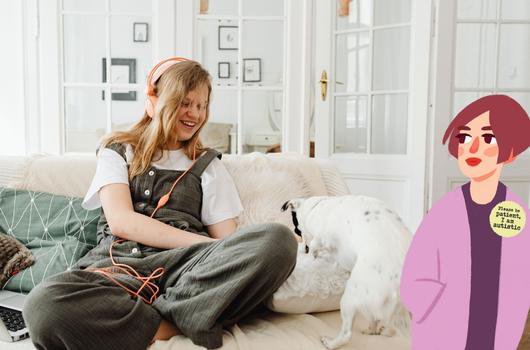
As an autistic person, I can find Christmas an overwhelming time for many reasons, and I thought that for those who are facing similar struggles with the festive period, this would be a useful guide!
What are some of the challenges that can come with the Christmas period?
Lights
Almost everywhere you go, whether it's in a shopping centre or even your school, there are bound to be Christmas decorations everywhere. The mix of colours and the brightness of the lights can really contribute to a sensory overload along with the other stresses that this time can bring.
Reacting to gifts
This can be a struggle for many as although we normally communicate about what presents we would like, there can be occasions where we could get something we dislike (such as vintage socks from your grandparents, trust me I've been there!). As presents are traditionally covered in wrapping paper, this can create extra anxiety as there isn't much of a visual cue of what the gift could be.
Having lots of people around you
The Christmas period also means that there are loads of events happening such as concerts, markets, and funfairs which all include one thing: a large amount of people. It's likely that many people will be at these events which could be overwhelming, especially if you don't know them.
Change to routine
There can be a lot of changes to your typical routine such as the changes in food, how the day will be structured, and the people you will see. This can be very unsettling.
What are some coping mechanisms I can try?
Speak to your family about anything worrying you and also what would be helpful. Communicate your needs in a way that works for you whether that's with visuals or verbal cues to discuss alternatives and solutions.
Understand your boundaries with people. It's massively important to make sure that you and those around you know what you like and dislike in terms of conversation topics, foods, presents, and how you would like to be greeted in a way that's most comfortable for you.
How can I help someone who is struggling?
Make a schedule of what is happening, when, and who will be there. This creates structure beforehand which gives others more time to organise parts of the day where they need to recover from being dysregulated in days leading up to Christmas.
Have some protected quiet time on the schedule. Make sure that you allow time to recover whether that is stimming alone, going for a walk, or listening to music. Discuss this together.
Make adjustments to support people – for example have ear defenders if there will be fireworks, and don't play music too loudly. Making sure that people feel heard and creating an accessible environment can make a world of a difference.
Open presents at the same time to reduce pressure. People are normally very excited to see what you get, and although this is a normal reaction for many people, it could be uncomfortable. Lots of people making eye contact at once can feel quite intimidating, whereas if people open them at the same time, nobody feels under pressure.
Consider people's needs in terms of physical interaction – for example offer a high five instead of a hug. With a lot of the stresses of Christmas, it is especially important to consider peoples' preferences with physical boundaries. It's always best to ask if they prefer more intimate physical interactions before going straight in!
I hope that this guide has been helpful and provides some much-needed comfort at this time!
Category: Young Mayor

